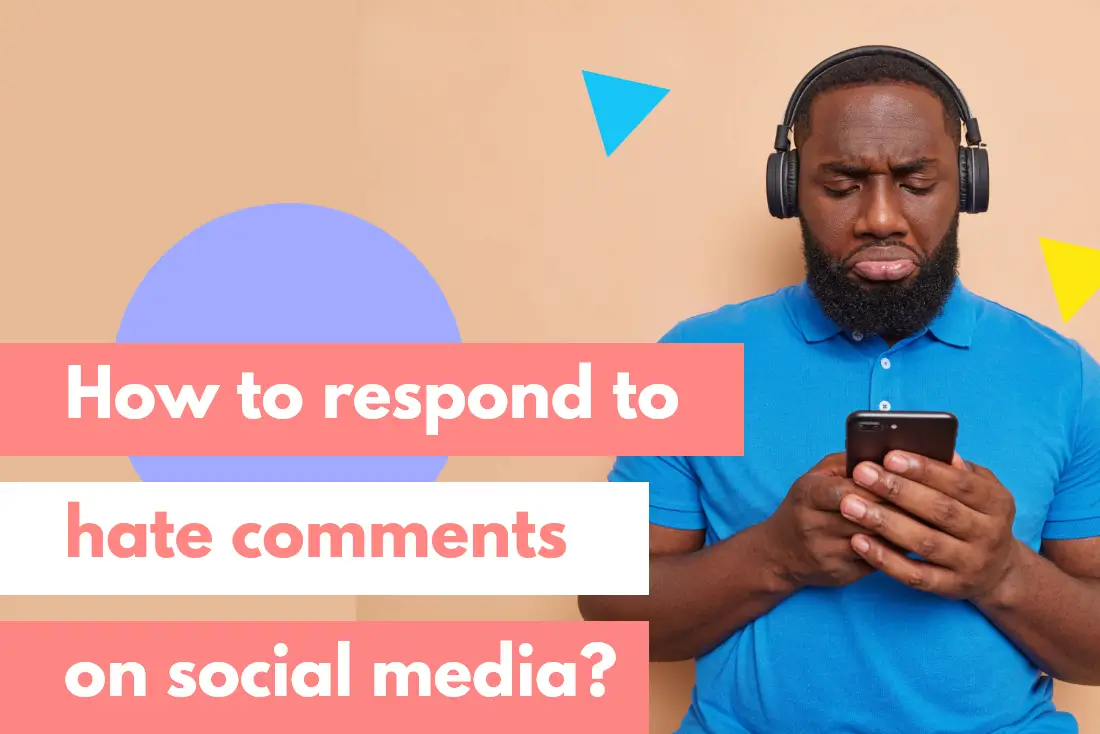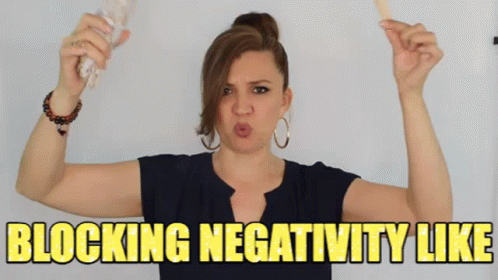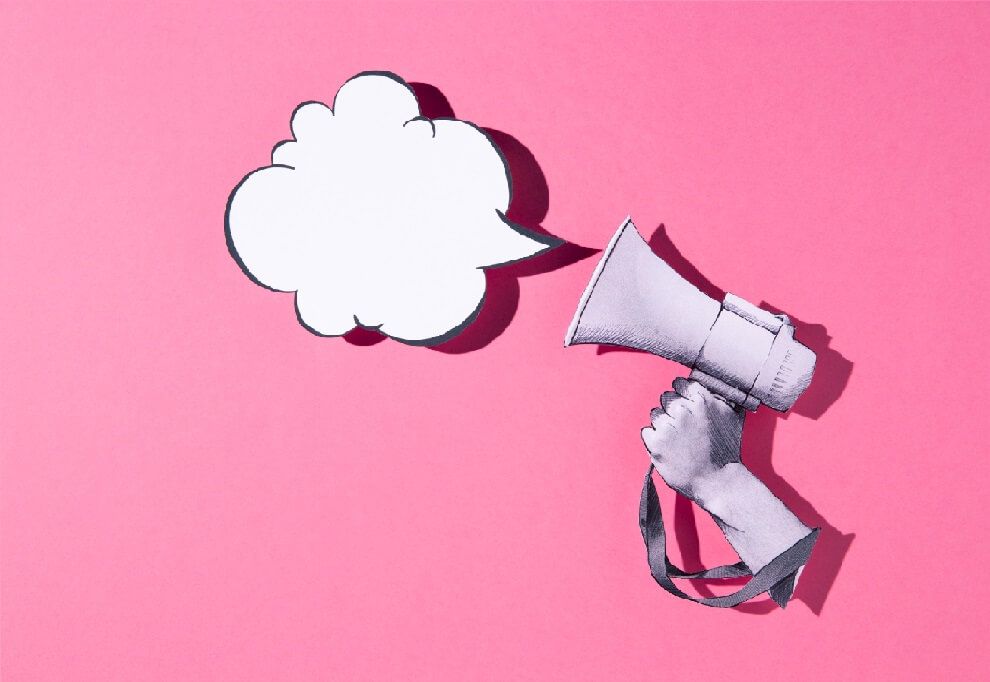How to Respond to Hate Comments on Social Media

Awesome Social
Published on:
August 2 , 2022
·7 min read

When you are in charge of managing the brand's social media communication, you need to be ready how to respond to unfavorable comments and feedback. Even though it can be quite challenging and irritating, the hostility you encounter on social media is one of the most significant possibilities.

Why do haters comment?
Some individuals are secretly envious of your position in life. So they put harsh comments on your posts. They believe that if they are able to highlight your shortcomings, they will be able to bring you down a peg. Also, they feel the need to do this because they feel threatened by your success. While in real life, you would most certainly reject a person like this, on the internet, they may be supported by other individuals saying the same thing because of the mob mentality of jealousy.
The most effective way to respond to a person who makes critical comments is to provide direct evidence that what the person is claiming is false and then sprinkle in some self-deprecating humor.
Because they are engaging in passive hostile behavior, some individuals will write nasty remarks. They may also be envious. But they will not be as explicit about what they say, making it more difficult to dispute with them. Attacks of this nature are typically not direct but rather imply something about the target. Besides, they tend to provoke others who are active on social media. Once more, the purpose is frequently to make you lose your composure. Stay strong in the face of their attacks.
The last reason individuals make comments is that they want to feel powerful by seeing you fail so they can feel better about themselves. These individuals are what people, in general, refer to as trolls. These commentators don't genuinely believe or feel anything that they remark on, even if they behave as though they do. Or, at the very least, they do not attach any emotional significance or importance to it. It is all part of a well-orchestrated assault designed to induce you to lose your composure and to give them a sense of superiority. In most cases, the most appropriate reaction to a troll is no response at all.

Ways to Respond to Hate Comments on Social Media
Some ways you can manage and deal with negativity that comes from social media are:
· Isolate yourself
It is essential that you isolate these remarks from your sense of yourself. Also, do not give them the opportunity to take root in any fertile ground. Maintain your attention on positive qualities. In addition, permit yourself to feel happiness in who you are and the things you've achieved in life. You will be able to respond to hatred from others with words that deflect hate and develop your self-confidence and your value if you believe in yourself and have the self-belief necessary to do it.
· Face them head-on
If the many critical remarks had been dealt with in the appropriate manner, a crisis might not have been caused by them. When you are more prepared before a problem grows, you will be better able to reply to hate comments and react to any bad posts that are made. To steer clear of potentially hazardous circumstances or, at least, to lessen the damage they do, formulate and put into practice a set of protocols, models, and tools for managing and monitoring social media platforms.

· Talk to someone
Having to contend with hostility and destructiveness might sometimes feel like an insurmountable burden. It is recommended that you discuss taking turns with your coworkers to prevent spending excessive time on it in a single day. By keeping track of that time with software, you may get a more accurate picture of how much time you spend on certain activities.
· Don't engage
When we are subjected to hateful words or statements, we frequently feel the intrinsic urge to defend our opinions or positions. Nevertheless, getting away from the conflict or separating yourself from it may frequently be a more productive method to handle the situation. You are not adopting their point of view or conceding that they are more knowledgeable by acting in this manner. Instead, it demonstrates that you have power over the circumstance, even though you are not participating in their harsh words, and it teaches self-efficacy and self-worth.
Hate speech or prejudice has a tendency to be communicated only in the form of criticism with very little to no substance behind it. When brought up for the sole purpose of inciting anger, expressing pessimism, or wounding the sentiments of another person, this typically does not create any grounds from which you may engage in a constructive conversation. You are able to deter their hostile statements and prevent promoting additional negative responses if you do not engage in this sort of interaction with them.
· Don't delete
Never, ever remove bad comments. It is quite doubtful that this will convince the individual to leave. It may even encourage them to write more. You can't just get rid of people you've had negative interactions with on social media platforms like Facebook, Twitter, Instagram and so on.
After the problem has been resolved, it is recommended by some manuals that you ask the commenters to delete their comments. In general, though, leaving addressed issues on your profile won't do any harm. And if anything, it will demonstrate that you are prepared to work toward finding solutions to difficulties.
If you want to proceed in that manner, you must first ensure that the issue has been completely remedied. Otherwise, the complaint will remain on the site even after it has been addressed, and no one will remove it.
· Talk personally
If the statement is clearly hurtful and lacking context, apologize to the commenter and ask how you can assist make the situation better. The recipient may then respond with something you are able to take action on. Or they may be so taken aback by your response that they are speechless and have nothing else to say. You will have handled the situation gracefully regardless of the outcome.
· Apologize when needed
It is preferable not to ignore or delete a remark if you feel there is some acceptable apology on your side. If you have this feeling, it is recommended not to ignore or delete a comment.
If someone posts a remark on your personal social media page criticizing something you did that you should have apologized for, you should address the issue in some way. This is because you do owe an apology for the behavior in question. At the same time, it is essential to avoid making promises that cannot be kept. Try to be as practical as possible when considering what you can do with an apology or reparation. This topic will be covered in the section where we talk about how to respond.
· Be polite
Being optimistic and courteous go hand in hand. In addition to being positive, you should also be nice. Avoid becoming involved in the conflict, and maintain your composure. Even if you are confronted with hostility, you must resist the need to react emotionally or lose your composure. It is possible that being nice to someone who is assaulting you or your company will feel difficult, but doing so will offer you an advantage over someone who is being rude.
· Use humor

You should also consider using comedy in your response, especially if you believe the circumstances warrant such an approach. If you are unsure of what you want to say, it is best to maintain a serious tone because it is less likely to be misconstrued in that setting. The use of comedy might be beneficial since it demonstrates that you have a fun personality and are not taking the matter too seriously. It has the same impact as being courteous or pleasant, but it also gives you a little of an advantage over the situation.
Suppose you have trouble figuring out how to deal with unfavorable comments on your social media page. In that case, one crucial consideration is whether or not you want to reply to the comment at all, taking into account the specifics of the situation. If you decide that you want to answer, you will have to determine whether you want to respond in a humorous or serious manner, as well as if you want to respond in public or have a private talk about it.
How to Respond to Hate Comments on Social Media : Final thoughts
No matter which way you decide to go, the essential thing to keep in mind is that your objective is not to take revenge on the person who gave you the bad comment. This is the most important thing to keep in mind. Rather, your objective can be to-
· Protect your good name.
· Come up with a solution to the problem.
· Convince people that your page is a secure haven.
· Clear up any misunderstandings.
Beyond that, it is not worth it to spend your energy and emotional resources on an internet persona who may or may not truly care whether or not you are angry.

